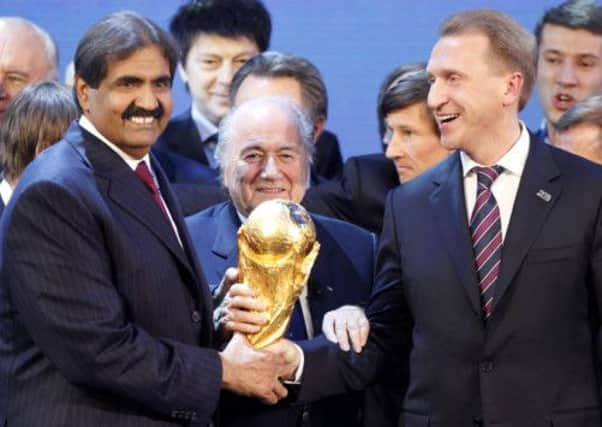Heat and humidity could leave fans feeling cold over World Cup in Qatar


PETER TAYLOR realised almost the moment he stepped off the plane as the newly-appointed manager of the Bahrain national team that playing a World Cup in a Middle East summer is going to be very, very difficult.
The intense heat was – unsurprisingly, considering temperatures peak at around 120 degrees Fahrenheit in July – the first thing that hit the former England Under-21s manager. That and the humidity, which Taylor soon realised made even the most routine activity uncomfortable.
Advertisement
Hide AdAdvertisement
Hide AdSo, as Taylor embarked on his new role in July, 2011, he admits to being a tad surprised that the organisers of the 2022 World Cup in neighbouring Qatar – the two countries share a border – were still sticking to the public stance that the tournament would go ahead as planned in the summer.
“I learned very quickly that you don’t walk much on the streets of Bahrain,” said Taylor, back in England after leaving the Gulf last year, to the Yorkshire Post in the wake of FIFA last week launching a consultation process on whether the 2022 finals should be moved to the winter months.
“And certainly no more than was absolutely necessary. It was just impossible, with the humidity being as much of a problem as the temperature. I had to hold training sessions at 10pm, as any earlier just wasn’t possible.
“I’d always finish training at midnight. And as we came off, I’d be sweating so much that it felt like I’d been doing the session myself rather than just observing from the sidelines.”
Advertisement
Hide AdAdvertisement
Hide AdThe road that has brought football to the point where a switch that will cause chaos to professional leagues across the globe seems the only option has been a long and controversial one.
At the start of the bidding process for 2022, Qatar were barely seen as a serious threat by the rival teams from Australia, South Korea, Japan and the USA. There was simply no way that a World Cup could be staged in such a punishing environment. Or so everyone thought.
All that changed, however, when the Qatari bidders unveiled their secret weapon. State-of-the-art technology that would see the stadiums, both at pitch level and in the stands, kept cool by solar panels.
A prototype stadium the size of a tennis court was built in Doha, the capital, and sufficiently wowed the World Cup inspection team on their visit in September, 2010, for the Qatar bid to suddenly be taken seriously. By December, Qatar had claimed 14 of the 22 FIFA executive committee votes to become the first Arab country to stage a World Cup.
Advertisement
Hide AdAdvertisement
Hide AdThis, though, proved to be only the start of the controversy with a switch to the winter, first mooted by UEFA president Michel Platini not long after the FIFA vote in Zurich, now looking certain.
For Taylor, who led Bahrain to Gold medal success in the 12th Arab games during his 18 months in charge, there can be no other feasible outcome.
“I looked on the internet at the temperature in Bahrain last weekend and it was 104 degrees,” said the 60-year-old.
“And that is in October, so you can imagine what the weather is like in the truly hot season of July and August.
Advertisement
Hide AdAdvertisement
Hide Ad“Over the border in Qatar, the temperatures are a touch hotter than Bahrain as well and that is why a World Cup played over there at the height of summer would be so difficult. First, the heat would be dangerous. Second, you would not see the type of World Cup match that we all want to see.
“The big thing I took from watching football out there – and it is why I missed England so much, in the end – is that the tempo of the matches was so bad because the players wanted to rest.
“In the end, they would go down injured when there was no way they were injured.
“Just to give themselves a breather, which I understood because the heat was just so intense. And these were players who had grown up in that climate. Can you imagine what it would be like for European players?
Advertisement
Hide AdAdvertisement
Hide Ad“I am not saying, for instance, Argentina v Australia in a World Cup would see players going down feigning injury just to guarantee a rest. But playing in that sort of heat is very, very hard.”
One game, in particular, from Taylor’s reign in charge of Bahrain stands out. He added: “We had a friendly in Azerbaijan, which isn’t actually as hot as Bahrain or Qatar. But it was held during Ramadan, when my players didn’t eat or drink properly.
“It was a proper FIFA game so only six subs were allowed but if ever there was a case to be made for 11 substitutes being allowed then it was this game. The players were really struggling with several being close to fainting.
“And that was in August, so a month or two after when the majority of World Cup games would be held.”
Advertisement
Hide AdAdvertisement
Hide AdDoubts over the viability of the technology designed to cool Qatar’s 12 stadia during the tournament are also adding to the question marks over staging the tournament even in November and December – as seems the preferred option at the moment – when temperatures dip to between 75-90 degrees Fahrenheit.
Taylor added: “The humidity is as much of a problem as the heat but what I will say is that the facilities and everything else will be top notch.
“That is the big difference between Doha and Bahrain, the facilities. Training grounds, the stadium, you name it will be fantastic.
“Qatar will want to put on a show and they will do it correctly. Having said that, I am still nervous about the heat, without a doubt.”